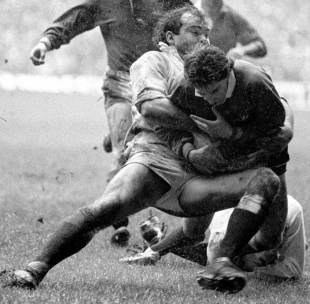|
Wales 19-12 England, Cardiff
Wales win 'a violently aggressive game '
Richard Seeckts
March 7, 1987

England's John Hall floors Jonathan Davies
© PA Photos Enlarge
England crossed the Severn Bridge in 1987 grimly aware that they had not beaten Wales in Cardiff since 1963, when the pitch was frozen solid and the television pictures black and white. The 24-year wait had become an uncomfortable burden they were determined to shed. They got it all wrong on this occasion, unleashing a fired up set of forwards in a violent match that ended in defeat and the suspension of the captain and three players. Wales were by no means innocent, however, giving almost as good as they got but, crucially, they won the match. After a hammering in Dublin, England's second match against France "saw an escalation of [Richard] Hill's cries for blood to be spilled," according to Brian Moore, who was on England's bench. Moore continued, "Just after the kickoff, Graham Dawe leapt up and rolled right over the top of the formed maul. He later smacked Pierre Berbizier off the ball; I couldn't see why he was marked down for this." Dawe was warned to mend his ways after France won 19-15, but the defeat raised the stakes for the likely wooden spoon match in Cardiff. It was rough from the start. Ray Megson, refereeing his first Five Nations match, had to break up a fight before Dawe threw in to the second lineout. After he threw, all hell broke loose. Accounts vary but the first significant contact was Welsh lock Steve Sutton's nose being broken by his partner Bob Norster's elbow. The free-for-all that followed included a mighty punch from Wade Dooley that shattered Phil Davies' cheekbone. Dooley later recalled reacting to a Welshman hitting Jon Hall. "I saw red, literally. It was a gut reaction, totally spontaneous. I lashed out at Hall's assailant, completely unaware of his identity, and the punch landed with a sickening thud on the side of Davies's face." The officials didn't see the punch and Dooley was fortunate to remain on the pitch. The loss of control among Hill's team was plain to see. Bill McLaren, a master of the understatement, mused on the BBC commentary, "There's a bit of nastiness festering all throughout this match and Ray Megson is having a really tough job." So tough a job, in fact, that Megson awarded 38 penalties in the match, 23 of them against England. Gerald Davies, in The Times, mourned the penalty count: "It was the kind of game which insisted on such an approach. But indicative of England's questionable attitude was the manner in which their captain queried almost every one of the decisions which went against his team. "
By half time, Swansea full-back Mark Wyatt had kicked 12 points for Wales, and missed with a further three shots at goal, and Marcus Rose nine points for England. What little rugby was played between the penalties was attritional at best. Midway through the second half, Jonathan Davies hoisted a high, swirling kick towards the corner. Rose dropped it, Rory Underwood made a hash of clearing up behind him and Welsh prop Stuart Evans was bundled over for the only try of the match, and his only international try. Wyatt and Rose added a penalty each. Wales deserved their victory only because England manifestly did not. It was felt that rugby's spirit had died a little that day in Cardiff, in what Davies called "a mean and bitter struggle", and "a violently aggressive game about which there was a shared sense of disappointment and shame." He concluded: "England, on the evidence of the French match and this one, have gone sadly astray." Wales and England finished bottom of the Five Nations table in 1987 with one win apiece, as much as either team merited. The RFU acted swiftly and firmly, condemning the behaviour of their team and, after due consideration, suspending captain Hill, Dawe, Dooley and Gareth Chilcott from the remaining Championship match against Scotland. No-one from the RFU or the England camp sought to justify England's performance. There was surprise, however, that none of the Welsh players were disciplined for their part in the rough stuff. Hill never captained England again, though he played regularly until the 1991 World Cup Final. Dooley was swiftly restored and Chilcott was in and out until Paul Rendall made the loose-head job his own. Dawe's suspension cost him dear. It opened the way for Brian Moore to make his successful debut against Scotland. The two remained fierce rivals for the hooker's berth for eight years, Moore always having the upper hand as he accumulated 69 caps for England and the Lions, while Dawe became a perennial bench-warmer, only taking the field for England twice more, in minor World Cup pool matches. In January 2014, Hill named Chilcott and Dawe in the best XV he has played with or against. © ESPN Sports Media Ltd
| |||||||||||||||
Live Sports
Communication error please reload the page.
-
Football
-
Cricket
-
Rugby
-
- Days
- Hrs
- Mins
- Secs
F1 - Abu Dhabi GP
Abu Dhabi Grand Prix December 11-131. Max Verstappen ()
2. Valtteri Bottas (Mercedes)
3. Lewis Hamilton (Mercedes)
4. Alexander Albon ()
5. Lando Norris ()
6. Carlos Sainz Jr ()
-
ESPNOtherLive >>
Golf - Houston Open
Snooker - China Open
Tennis - Miami Open

